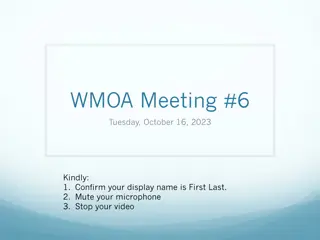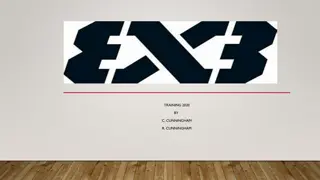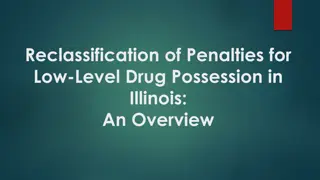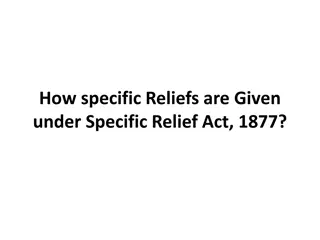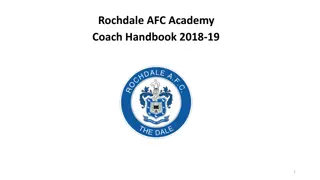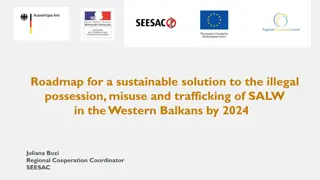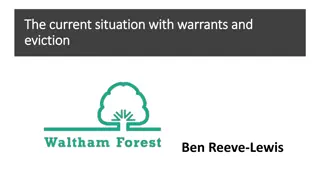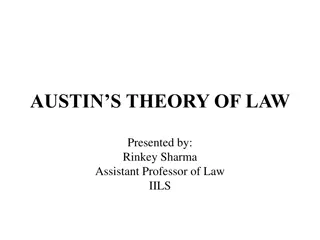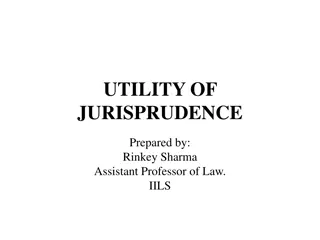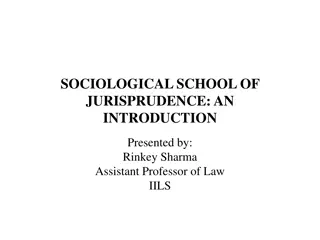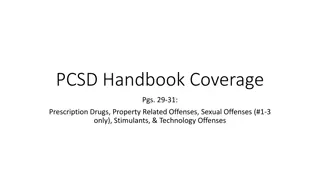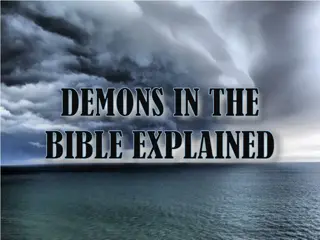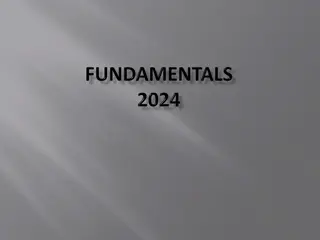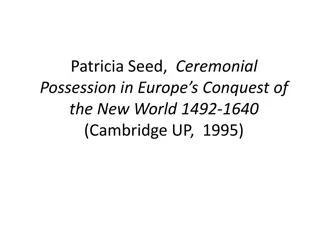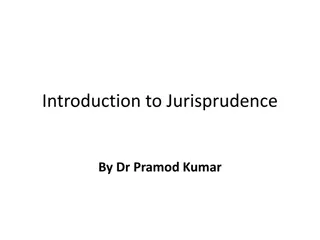Understanding Possession in Jurisprudence
Possession in jurisprudence is defined as the closest relationship between a person and a thing they possess. It involves physical control and the intention to exercise that control. Various legal scholars have provided definitions to explain the concept of possession, highlighting the significance of physical control, intention, and exclusivity. Possession plays a crucial role in determining ownership and rights over property.
Download Presentation

Please find below an Image/Link to download the presentation.
The content on the website is provided AS IS for your information and personal use only. It may not be sold, licensed, or shared on other websites without obtaining consent from the author. Download presentation by click this link. If you encounter any issues during the download, it is possible that the publisher has removed the file from their server.
E N D
Presentation Transcript
JURISPRUDENCE-II Lecture:3 Chapter: Possession Semester: 6th Khyber Law College University of Peshawar
AGENDA Definition Ownership Kinds of ownership Conclusion
INTRODUCTION It expresses the closest relation of fact that can exist between a thing and the person, who possess it. In law, possession means it includes not only physical control over a thing Example: A has an article in his hand. In other words, he is in possession of that article. The person who is in possession is called a 'Possessor'. In human life, consumption of material things is very essential and it would be Impossible without the position of the material things.
DEFINITIONS Literally: The ownership, control, or occupancy of a thing, most frequently land or Personal Property, "Possession" literary means physical control over a thing or an object. But also an intention to exercise that physical control. The person who is in possession is called a 'Possessor'.
DEFINITION John Salmond: Salmond defines Possession as, "possession is the continuing exercise of a claim to the Exclusive use of an object." Savigny: Savigny defines Possession as, "intention coupled with physical power to exclude others from the use of material object. Salmond criticized Savingy's definition and ground that Savingy committed an error by including the element of physical power in his definition.
DEFINITION O.W. Holmes: Holmes defines Possession as, "To gain Possession a man must stand in a certain physical relation to the object and to the rest of the world, and must have certain intent. Maine: Maine defines the possession as, "physical detention coupled with the intention to hold the things detained as one's own.
CONTINUED . . . . Sir Frederick Pollock: Sir Frederick Pollock defines Possession as, "In common speech a man is said to possess to be in possession of anything of which he has the apparent control from the use of which he has apparent power for excluding others. Ihering: The best among them is the definition given by Ihiring. According to him, "whenever a person looked like an owner in relation to a thing, he had possession of it unless Possession was denied to him by rules of law based on practical convenience."
KINDS OF OWNERSHIP Corporeal and Incorporeal Ownership Corporeal ownership It is the ownership of a material object. Ownership of a house, a table or a machine is corporeal ownership. The distinction between corporeal and incorporeal ownership is connected with the distinction between corporeal and incorporeal things. Corporeal ownership is described as ownership over tangible things. Corporeal things are those which can be perceived and felt by the senses and which are tangible.
ELEMENTSOF POSSESSION From the above definition we could see in that possession have two essentials - 1) Actual power over the object possessed. I.e. corpus possession is and 2) Intention of the possessor to exclude any interference from others. i.e. animus possidendi. According to John Salmond, both corpus and animus must be present to constitute Possession. Ownership is a legal concept whereas Possession is factual as well as legal concept. The term CORPUS and the term ANIMUS, both the terms borrowed from the Roman Law.
CATEGORIESOF POSSESSION: Possession is divided into two categories. Possession in fact Possession in fact is actual or physical possession. It is physical relation to a thing. Possession in law. Possession in law means possession in the eye of law. It means a possession which is recognized and protected by law. There is sometimes a discrepancy between possession in fact and position in law, although usually possession exists both in fact and in law in the same person. A person who is in de facto possession of a thing also comes to have de jure possession.
MODESOFACQUIRINGPOSSESSION: Delivery: Delivery completes voluntary act from one person to another. The transferor gives actual position to the transferee. It is usually a lawful mode of possession. Delivery may be actual of constructive. In actual delivery the thing is physically delivered.
CONTINUED.. Taking: Taking implies an Act exclusively on the part of the person who physically takes the Possession. It is acquisition of the Possession without the consent of previous Possessor. It is the possession without the consent of the Possessor. Sometimes it is said to be unilateral act. Transferee acquires the possession without the knowledge or consent of the former Possessor of the thing. It is usually possessio-civilis. It may or may not be lawful. If it is lawful then it is legal possession. i.e. possessio-juri.
KINDSOF POSSESSION: o Corporeal It is claimed to the exclusive use of material things like land, buildings and other movable or immovable things. The exercise of this claim consists of two ingredients, Corpus Possessionis and Animus Possidendi. This case of possession consists of firstly, continuous exclusion of alien interference. Secondly, enjoyment of the thing at will without interference by others. The actual use of it is not essential. A man may lock his watch in a safe and don t look at it for 20 years. Here he has exercised continuous claim to it, by continuously excluding any other person from interfering with it.
KINDSCONTINUED.. Incorporeal It is connected with intangible things such as trademark, goodwill, right to vote, right to passage, etc. In this case, things are to be used continuously, as non-use of it may give rise to the non-existence of possession for such thing. One can acquire and retain possession of a right of way only through actual and repeated use of it. English law defined it as the continuing exercise of right rather than the continuous exercise of the claim.
KINDS. Mediate Possession : It is the Possession of a thing through another, either through his friend, servant for agent. As the thing remains, in possession with another, the possessor has lesser degree of physical control over such thing. Illustration : a) 'X' has a car, which he leaves with his driver. The possession of the driver will be immediate whereas the Possession of 'X' will be mediate. b) 'A' purchased a house through his agent and the agent got the possession. A's possession is said to be the mediate possession.
KINDS. Immediate Possession : It is also called as Direct Possession. Direct or primary possession by a person over a particular object, which acquires or gets directly or personally. In immediate possession, as the thing is in possession of the possessor directly, he has higher degree of control over such thing. It means that there is no other person holding the thing. Illustration : a) 'X' has a car and he keeps it in his garage, this constitutes immediate possession. b) 'A' purchased a house and takes Possession of the property it is called direct or immediate Possession.
KINDS o Constructive Possession : Constructive possession is not actual possession it is a possession in law and not possession in fact. According to Pollock and Wright, it is a possession which arises only by the construction of law. Example : The delivery of the keys of a building. Adverse Possession : It means holding the land on his own behalf of some other person. if adverse possession continues peaceful and undisturbed for that number of years, he can claim ownership and the true owner's right( ownership) gets extinguished.
KINDS. o De facto Possession : De facto Possession exists where the thing is in the immediate occupancy of a party. The person in de facto possession has the physical control of the thing to the exclusion of others and has Animus and Corpus over the material object. De facto possession may be described as actual Possession. De jure Possession : De jure possession can be described as possession in law. De jure possession exists when person claims a thing as his own in natural normal legal manner by occupying a thing without any dispute as to his legal right to possess and enjoy the thing. Legal possession may exist with or without property in possession. In case of De jure possession it is just possible that a man I have ceased to live in a house but without intending and to abandon it for good as the owner of the house.


